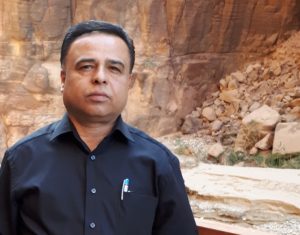Ahmad Battaah was born in 1969 in Ajja, Jenin, Palestine. He graduated in 1990 from Al-Rawda College, where he received a diploma in business administration and architectural drawing. He worked for 15 years in union work and as a member of the Palestinian General Federation of Trade Unions and assisted in the establishment of several unions. He was later appointed president of the Timber and Construction Association and contributed to the drafting of the Palestinian Labor Law. Furthermore, he has participated in several international and local workshops, such as the art of negotiation at the Workers University in Cairo in 1996.
Ahmad first worked in the private sector but was later appointed mayor of Ajja in 2011 and was subsequently elected mayor for two electoral cycles, remaining in office till today. He was also elected twice as president of the Charitable Cooperative Society in the town of Ajja. Furthermore, Ahmad was part of a training program organized by the Arab Planning Institute regarding planning policies and programs for local development. In coordination with them, he created a National Observatory for Sustainable Development in the town of Ajja, which advanced Ajja’s services, infrastructure projects, and sustainable development. In addition to creating a new image for local governance of a village, and the part it could play in contributing to sustainable development, he worked to break away from stereotypical evaluations of local-council service provision. This was made clear during the many activities and innovative projects held in Ajja this year which affected various work sectors such as energy, infrastructure, investment, and administrative development. This was combined with development and investment projects and the creation of solar power fields, one of which produces 1 mega. Funding countries were contacted, and two municipality projects have been implemented. These projects aim to nurture economic and local independence, as well as empower sustainability and durability regarding a safe, green environment, which is already planned as part of an overall project to empower and encourage ecotourism in Ajja. This plan includes creating Ajja’s green forest and a six-kilometer nature walk, restoring historical artifacts and sites, building Ajja’s public park, organizing workshops and seminars, and training the local community and the council/municipality’s staff locally and internationally, all of which aims to take tourism to the next level.
Encouraging an ecotourism culture is already in the works as a few municipalities have been contacted and a number of workshops have been held, the first of which was held in Jordan, with the Royal Society for the Conservation of Nature. Other workshops have been offered across Palestine that aim to help and encourage local municipalities to promote ecotourism and spread an understanding of its value for the environment and for local communities, as well as its important role in empowering the economy. These workshops have resulted in the creation of the Palestinian Society for Ecotourism in Jerusalem. Through the efforts of Ahmad Battaah, president of the society, plans are in place regarding funding and investment, encouraging ecotourism, and attracting tourists. Work has begun on a new project to create energy from domestic waste, and international parties have been contacted regarding the matter. The aim is to facilitate economic independence for families in Palestine.


